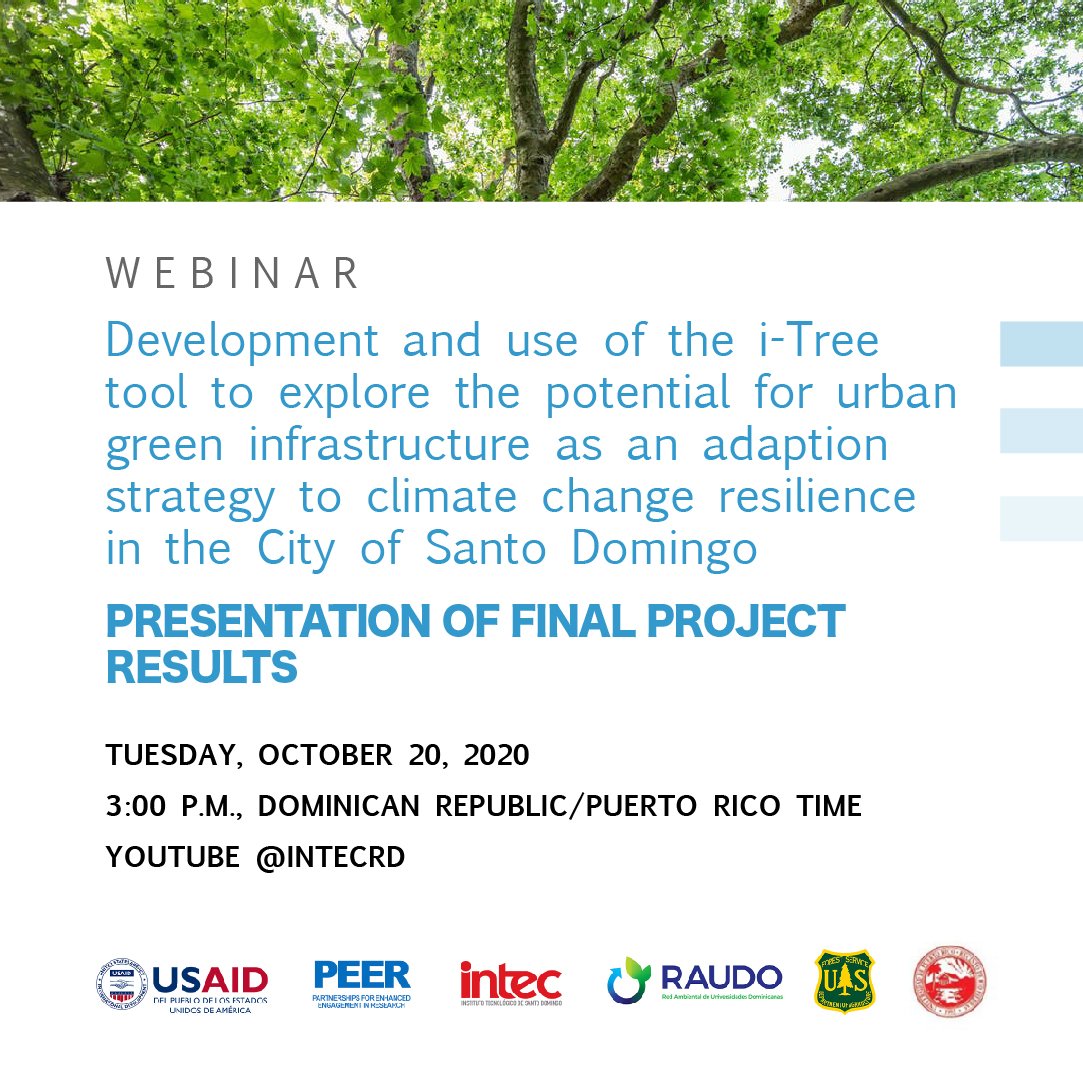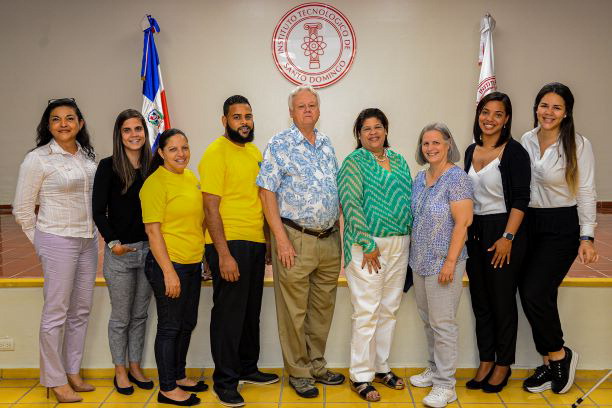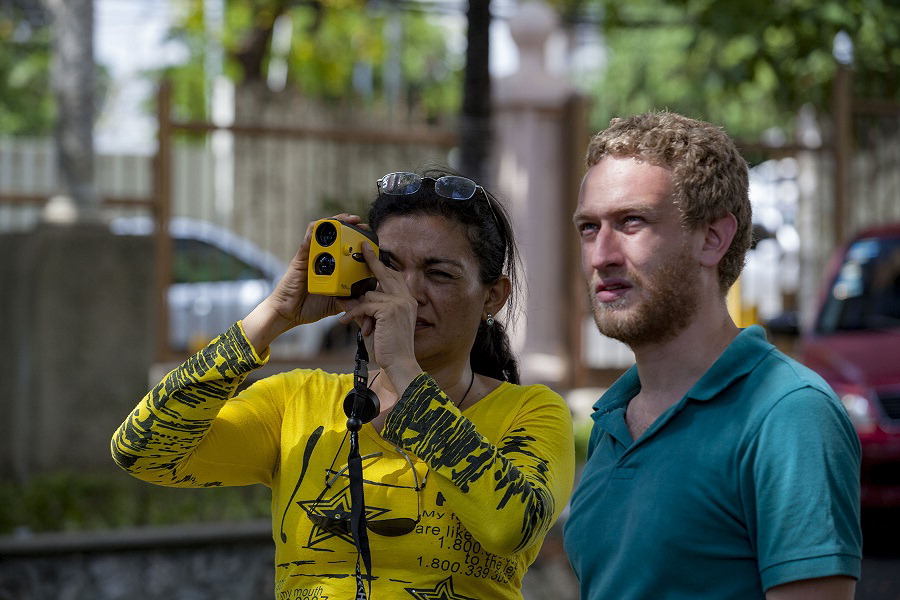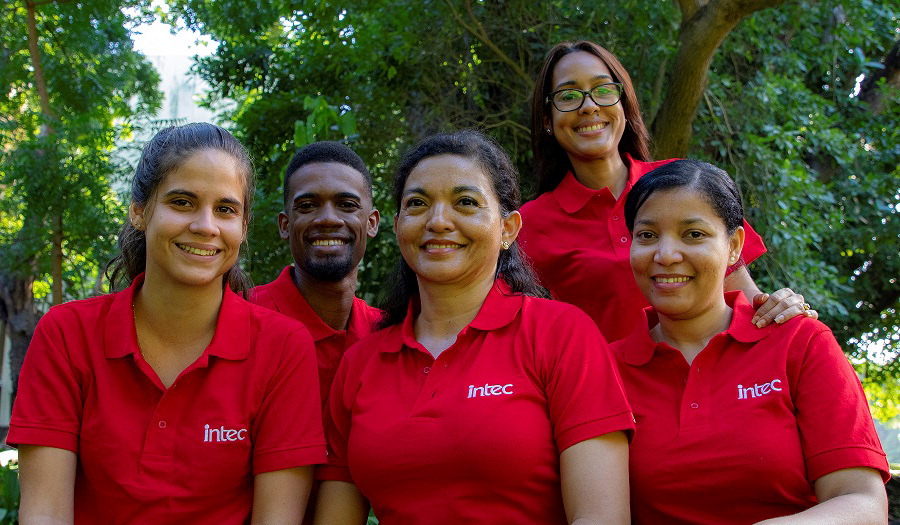Cycle 5 (2015 Deadline)
Development and use of the i-Tree tool to explore the potential for urban green infrastructure as an adaption strategy to climate change resilience in the City of Santo Domingo
PI: Solhanlle Bonilla Duarte (solhanlle.bonilla@intec.edu.do), Instituto Tecnológia de Santo Domingo (INTEC)
U.S. Partner: Gerald Bauer, U.S. Forest Service, International Institute of Tropical Forestry
Project dates: January 2017 - November 2020
Project Overview:
 | |  | | | From left to right: Mirel Volcan (field technician), Claudia Caballero (graduate student of the project), Maria and Luis Paulino (field technicians of bird watching), U.S. Partner Dr. Gerald Bauer, project PI Dr. Solhanlle Bonilla, Olga Ramos (USFS headquarters Puerto Rico), Gilkauris Rojas (co-researcher of the proposal presented for the city of Santiago), Ana Pou (Assistant of the Stewardship Mapping and Assessment Project). | |  | | | PEER/INTEC students with the PEER project coordinator | |  | | | PEER INTEC team. Photo credit: G. Bauer | | This study used an Ecosystem Services approach to generate information for land use planning within the context of climate change adaptation. This approach employed science-based indicators that classified ecosystems and their functions and potential services to evaluate the influence of social, economic, and environmental service flows on human well-being, with the ultimate goal of guiding land-use planning. Reducing the impacts of urbanization and climate change has been a primary target of ecosystem services research, but research activity of this type in the tropics had been limited. The i-Tree is a public domain model provided by the USDA Forest Service and was used to aid planners and managers in the valuation and management of urban forests by quantifying the ecosystem services they provide. Although the i-Tree tool has been widely used in many U.S. cities and internationally, its use in the Caribbean had been very limited as well. The proposed project assisted in gathering scientific information that could be readily used to set ecosystem function and services management goals and evaluate climate change scenarios that were appropriate for a tropical ecosystem context, thus expanding the i-Tree model. Additionally, this project established an innovative collaborative platform that integrated multiple scientific disciplines with outreach and education towards greater understanding of urban infrastructure and sustainability. As many small island nations, the Dominican Republic is vulnerable to climate-related impacts, including sea level rise, flooding, heat, prolonged droughts, and disruptions in water supply. State and local agencies in the DR addressed these potential impacts and worked towards developing adaptation strategies in collaboration with U.S. based agencies, including USAID and the USDA Forest Service. Urban areas, such as Santo Domingo, were of particular concern because of the greater number of people living in particularly poor, marginalized communities located in high-risk areas. The extensive and aging infrastructure throughout the city and the lack of forest vegetation created added risks such as urban flooding and water quality issues that would exacerbate climate-related impacts and biodiversity impoverishment. The Instituto Tecnológico de Santo Domingo (INTEC), in partnership with the Municipality of Santo Domingo, USAID, Universidad de Puerto Rico, and USDA Forest Service, took steps to develop adaptation strategies, such as the use of green infrastructure at the watershed level to minimize flood risks throughout the city. The i-Tree tool, which is a widely used application in cities worldwide, was used to assess and manage community forests and their faunal communities, and link urban forest management to environmental quality and community livability in the Santo Domingo area.
Final Summary of Project Activities
Dr. Bonilla and her team embarked on a collaboration with i-Tree Forest Service scientists to conduct an extensive assessment of urban green infrastructure in Santo Domingo. This initiative is pivotal in understanding and enhancing the city's green spaces, biodiversity, and the ecosystem services they provide. Utilizing i-Tree tools, the project aimed not only to quantify the extent and health of green areas, but also to evaluate their contributions to environmental quality and resilience in the face of climate challenge.
Central to their approach was the empowerment of local stakeholders through targeted workshops and training sessions. These efforts were designed to equip municipal managers, decision-makers, and community leaders with the knowledge and tools necessary to effectively manage and sustain urban green spaces. By building local capacity, the project not only fostered a deeper appreciation for the role of urban forests but also strengthened collaborative networks across academia, civil society, and government sectors.
The project's impact extends beyond academic circles. It altered perceptions of urban forests, highlighting their critical role as providers of essential environmental services and as integral components of climate adaptation strategies. Through the establishment of air quality monitoring networks and in-depth biodiversity assessments, the project contributed significantly to advancing scientific understanding and public awareness of urban ecosystems' complexities and values.
Moreover, the project made substantial strides in education and outreach, having trained a diverse cohort of over 200 individuals both nationally and internationally in the use of i-Tree tools. This capacity-building effort includes engaging students and municipal staff in hands-on research activities, thereby fostering a new generation of urban forestry practitioners equipped to address contemporary urban planning challenges.
One of the project's standout achievements lies in its comprehensive inventory of green spaces and species diversity throughout Santo Domingo. By establishing more than 206 measurement plots and conducting detailed surveys in residential areas, the project has generated invaluable data that not only informs local policymaking but also contributes to broader scientific discourse on urban biodiversity conservation and management.
The significance of the project is further underscored by its contributions to Santo Domingo's recognition as a bird-friendly city, a testament to the project's holistic approach to urban ecosystem management. By integrating scientific research with practical outcomes, such as policy recommendations and community engagement initiatives, the project exemplifies a model for sustainable urban development rooted in rigorous scientific inquiry and collaborative partnerships.
Looking ahead, the project holds tremendous potential for scaling its methodologies and tools to benefit other urban areas facing similar challenges worldwide. By sharing its findings and best practices through national and international forums, the project not only enhances global knowledge but also catalyzes future research endeavors and policy innovations aimed at promoting resilient and livable cities.
Back to PEER Cycle 5 Grant Recipients
|







